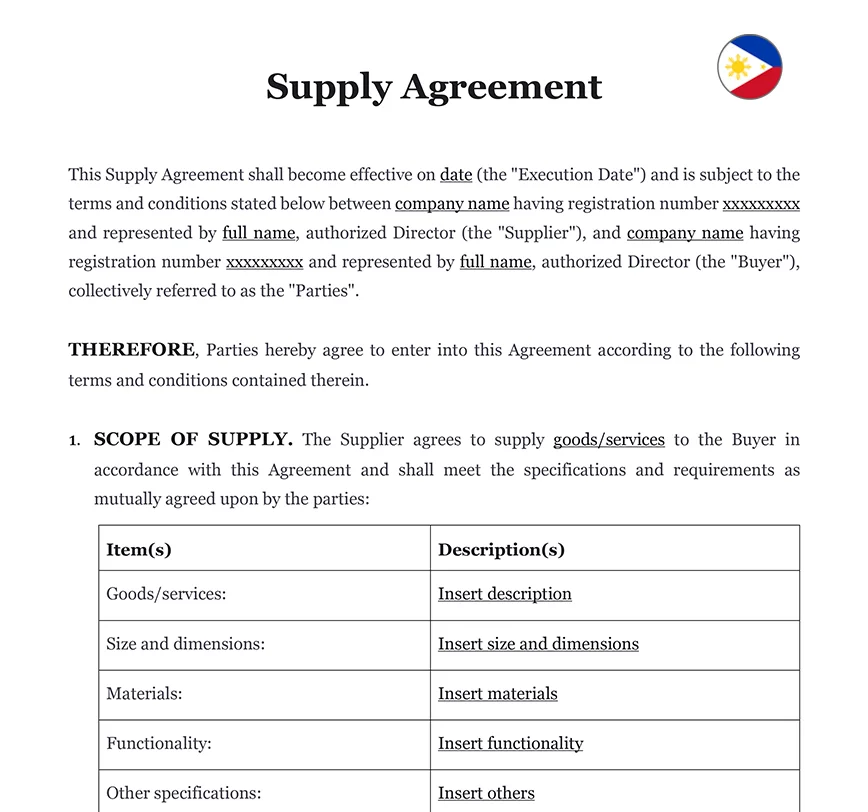Ready to use legal template
Drafted by experienced lawyers
Compliant with Filipino law
Ready to use legal template
Drafted by lawyers
Compliant with Filipino law
Home › Business contracts › Supply Agreement
Learn more about Supply Agreement in Philippines
Using a supply agreement in the Philippines is essential for several reasons. Firstly, a supply agreement helps minimize risks by clearly defining the rights and obligations of both parties involved, including aspects such as delivery terms, quality standards, and payment terms. This clarity helps prevent misunderstandings and disputes, fostering a smooth and transparent business relationship. Secondly, a supply agreement provides protection for intellectual property, ensuring the confidentiality and non-disclosure of proprietary information. Additionally, it establishes quality control measures, warranties, and remedies for non-compliance, safeguarding the quality of supplied goods or services. The inclusion of provisions on liability, indemnification, and dispute resolution helps mitigate financial risks and enables efficient resolution of conflicts.
Table of contents
-
What is a Supply Agreement?
-
When to use a Supply Agreement in the Philippines?
-
How to draft a Supply Agreement for Your Business?
-
What should a Supply Agreement include?
-
What are the benefits of using a Supply Agreement?
-
What difference between Distributor and Supply Agreement?
-
What are the legal considerations for supplier in the Philippines?
-
How to protect your business with our template document?
What is a Supply Agreement?
A supply agreement is a legally binding contract between a supplier and a buyer that outlines the terms and conditions of the supply of goods or services. In the context of business in the Philippines, a supply agreement establishes a framework for the consistent and reliable provision of products or services from a supplier to a buyer. It specifies important details such as pricing, quality standards, delivery schedules, payment terms, and any other relevant obligations and responsibilities of both parties.
When to use a Supply Agreement in the Philippines?
Supply agreements are essential in various business scenarios in the Philippines. They are commonly used when a business relies on a specific supplier to provide goods or services consistently over a period of time. This can include situations where a manufacturer sources raw materials, a retailer purchases products for resale, or a service provider engages subcontractors. Supply agreements provide clarity, protect the interests of both parties, and help establish a long-term business relationship based on mutual trust and reliability.
How to draft a Supply Agreement for Your Business?
To create a solid supply agreement for your business in the Philippines, it is crucial to consider several key aspects. Start by clearly defining the parties involved and their roles and responsibilities. Specify the goods or services being supplied, including their quality standards and specifications. Outline pricing and payment terms, including any discounts, payment schedules, or penalties for late payment. Include provisions related to delivery, shipment, and risk of loss. Address intellectual property rights, confidentiality, and dispute resolution mechanisms. Consult with legal professionals familiar with Philippine contract law to ensure compliance and accuracy in drafting the agreement.
What should a Supply Agreement include?
1. Parties and Contact Information
Clearly identify the supplier and the buyer, including their legal names, addresses, and contact details.
2. Scope of Supply
Define the goods or services being supplied, including quantity, quality standards, specifications, and any applicable warranties.
3. Price and Payment Terms
Specify the pricing structure, payment methods, terms of payment, and any applicable taxes or fees.
4. Delivery and Shipment
Outline the terms for delivery, including shipping arrangements, delivery schedules, and transfer of ownership or risk of loss.
5. Term and Termination
Define the duration of the agreement and conditions under which either party can terminate the contract.
6. Intellectual Property Rights
Address ownership and protection of intellectual property related to the supplied goods or services.
7. Confidentiality and Non-Disclosure
Include provisions to protect confidential information shared between the parties.
8. Dispute Resolution
Specify mechanisms for resolving disputes, such as negotiation, mediation, or arbitration.
What are the benefits of using a Supply Agreement?
Having a well-defined supply agreement offers several benefits for businesses operating in the Philippines. Firstly, it establishes clear expectations and responsibilities for both the supplier and the buyer, minimizing misunderstandings and potential disputes. A solid supply agreement helps ensure a consistent and reliable supply of goods or services, allowing businesses to meet customer demands efficiently. It also provides a legal framework for addressing issues such as pricing, quality, delivery, and payment terms. Additionally, a well-structured supply agreement can help foster strong relationships with suppliers, leading to potential cost savings, improved product quality, and increased customer satisfaction.
What difference between Distributor and Supply Agreement?
In the Philippines, a distributor agreement and a supply agreement are two different types of contracts that govern business relationships, specifically in the context of product distribution and supply.
A distributor agreement is a contract between a supplier or manufacturer and a distributor. It outlines the terms and conditions under which the distributor will sell and distribute the supplier’s products. The distributor typically purchases the products from the supplier at a wholesale price and assumes the responsibility of marketing, selling, and delivering the products to customers or other retailers. The distributor agreement may specify the territory in which the distributor is authorized to operate, the pricing structure, marketing obligations, exclusivity rights, and other terms related to the distribution arrangement.
On the other hand, a supply contract is a contract between a supplier or manufacturer and a buyer, which could be a distributor, retailer, or another business entity. Unlike a distributor agreement, a supply agreement focuses primarily on the provision of goods or services rather than the distribution aspect. It outlines the terms and conditions under which the supplier will supply the agreed-upon goods or services to the buyer. This includes specifying the quantity, quality, delivery terms, payment terms, and any other relevant provisions related to the supply of goods or services. A supply contract can be used for various business relationships, such as between a manufacturer and retailer, or between a service provider and a client.
What are the legal considerations for supplier in the Philippines?
When entering into a supply agreement in the Philippines, it is essential to consider the legal aspects to protect your business interests. Firstly, ensure that the agreement complies with Philippine contract law and adheresto any specific regulations or industry requirements applicable to your business. It’s advisable to consult with a legal professional experienced in Philippine contract law to ensure compliance.
Some important legal considerations for supply agreements in the Philippines include:
| ➤ Contract Formation: Ensure that the agreement meets the requirements for a valid contract, including offer, acceptance, consideration, and mutual intent to create legal relations. |
| ➤ Governing Law and Jurisdiction: Clearly state the governing law that will govern the interpretation and enforcement of the agreement. Additionally, specify the jurisdiction where any disputes will be resolved. |
| ➤ Compliance with Regulations: Take into account any industry-specific regulations or laws that may impact the supply of goods or services. This can include product safety, labeling, packaging, or licensing requirements. |
| ➤ Intellectual Property: Address ownership, protection, and use of intellectual property rights, such as trademarks, copyrights, or patents, to safeguard your business interests. |
| ➤ Termination and Breach: Clearly outline the circumstances under which either party can terminate the agreement, as well as the consequences of breach or non-compliance. |
| ➤ Liability and Indemnification: Define the extent of liability for each party and consider including indemnification clauses to protect against potential losses or damages. |
| ➤ Confidentiality and Non-Disclosure: Include provisions to protect confidential information shared between the parties and outline restrictions on its use and disclosure. |
| ➤ Dispute Resolution: Specify the preferred method of dispute resolution, such as negotiation, mediation, or arbitration, to provide a mechanism for resolving conflicts. |




